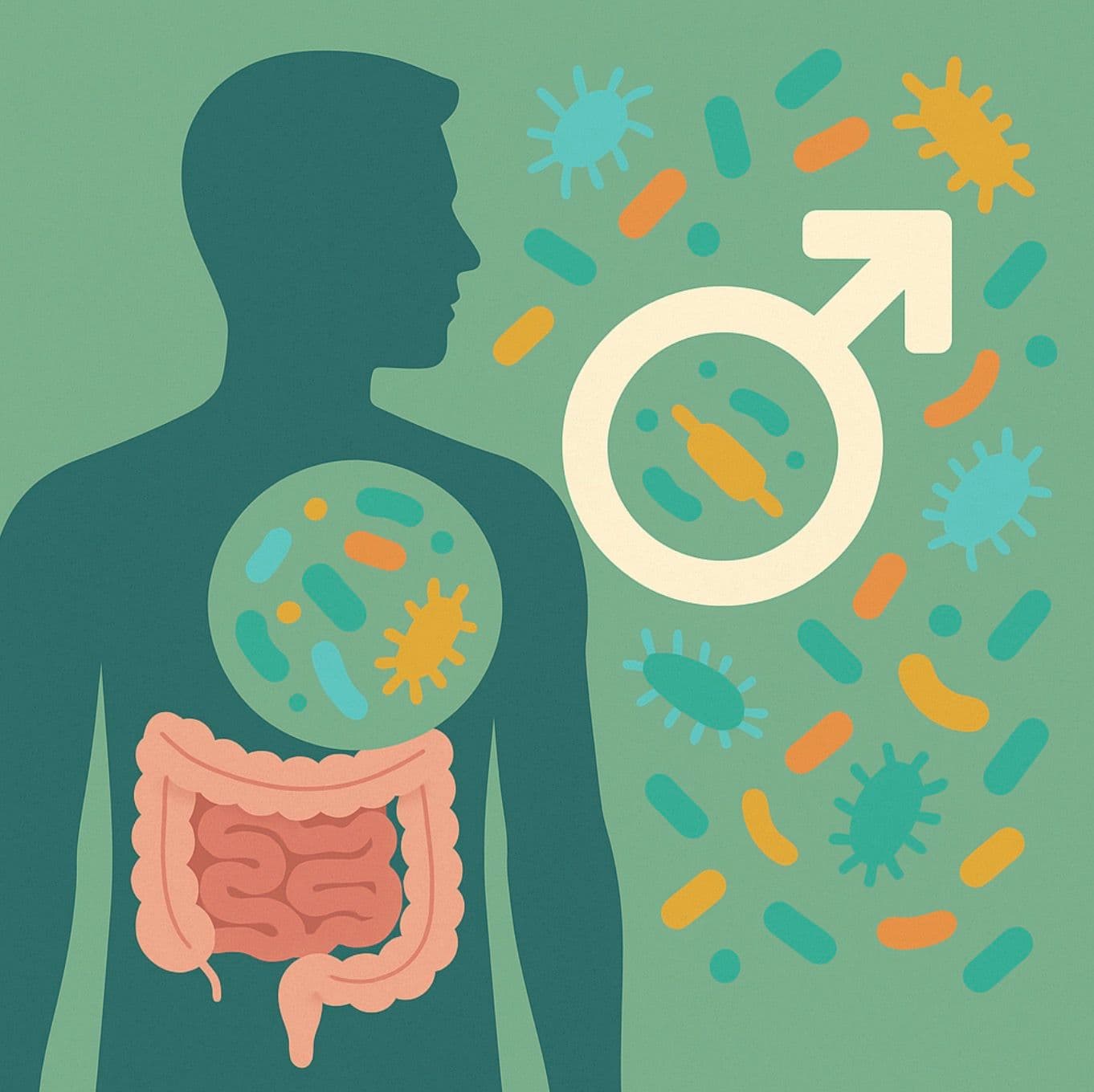How Your Microbiome Affects Testosterone: The Gut-Testosterone Connection
Published on:
Updated on:

People are asking...
With continued estrogenification of our environment in societal wide decreases in testosterone and sperm count, not everyone is going to necessarily f...
The question really comes down to do you have primary or secondary hypogonadism. If you have primary hypogonadism, you could take all the enclomiphene in the world and it would not adequately raise th... See Full Answer
What your thoughts are on men with Crohn's disease taking testosterone I know my levels are low from years of severe malnutrition and Prednisone use i...
Testosterone is actually an approved treatment for Crohn's Disease Testosterone therapy in men with Crohn's disease improves the clinical course of the disease: data from long-term observational regi... See Full Answer
Why does testosterone increase my anxiety ?...
Most men who use testosterone actually report a decrease in anxiety. We have seen that men who use testosterone that aromatize to excess (ie convert the testosterone to estrogen) are the ones who comp... See Full Answer
Have a question? Ask us.
At AlphaMD, we're here to help. Feel free to ask us any question you would like about TRT, medical weightloss, ED, or other topics related to men's health. Or take a moment to browse through our past questions.
You’ve heard “trust your gut” — but did you know your gut might also have a say in your testosterone levels?
At AlphaMD, we talk a lot about optimizing testosterone and overall health — but one underrated factor is your gut microbiome. That’s the massive community of bacteria living in your digestive tract, and it’s not just helping you break down food — it’s influencing your hormones too.
Gut Health = Hormone Health
The microbiome helps regulate inflammation, supports immune function, and even plays a role in hormone production and metabolism — including testosterone. Studies show that when your gut bacteria are imbalanced (a condition called dysbiosis), it can negatively affect:
- Testosterone production
- Estrogen detoxification
- Cortisol levels (your stress hormone, which can suppress testosterone)
In short: a disrupted gut means disrupted hormones.
The Testosterone Boosting Trio: Probiotics, Prebiotics, and Fiber
A healthy gut microbiome thrives on the right fuel — and here’s how you can support it:
- Probiotics (good bacteria): Found in fermented foods like yogurt, kefir, sauerkraut, and kimchi — or in quality supplements. Probiotics help reduce inflammation and improve the body's ability to produce testosterone naturally.
- Prebiotics (food for good bacteria): Found in foods like onions, garlic, bananas, and oats. These help the good bacteria flourish.
- Fiber: Soluble fiber in fruits, veggies, legumes, and whole grains helps maintain gut lining integrity and supports microbiome diversity.
Research has linked high-fiber, probiotic-rich diets with higher testosterone levels and better overall metabolic health.
Final Thoughts: Don’t Ignore the Gut
Whether you’re managing low T or just aiming for peak vitality, your gut health deserves attention. Prioritize whole foods, fiber, and probiotic-rich meals. Not only can this help improve testosterone production, but it can also elevate energy, mental clarity, and long-term wellness.
At AlphaMD, we’re here to help you optimize your hormones and your health — from the inside out.
Have a question? Ask us.
At AlphaMD, we're here to help. Feel free to ask us any question you would like about TRT, medical weightloss, ED, or other topics related to men's health. Or take a moment to browse through our past questions.
People are asking...
With continued estrogenification of our environment in societal wide decreases in testosterone and sperm count, not everyone is going to necessarily f...
The question really comes down to do you have primary or secondary hypogonadism. If you have primary hypogonadism, you could take all the enclomiphene in the world and it would not adequately raise th... See Full Answer
What your thoughts are on men with Crohn's disease taking testosterone I know my levels are low from years of severe malnutrition and Prednisone use i...
Testosterone is actually an approved treatment for Crohn's Disease Testosterone therapy in men with Crohn's disease improves the clinical course of the disease: data from long-term observational regi... See Full Answer
Why does testosterone increase my anxiety ?...
Most men who use testosterone actually report a decrease in anxiety. We have seen that men who use testosterone that aromatize to excess (ie convert the testosterone to estrogen) are the ones who comp... See Full Answer
Get $30 off your first month’s order
Enter your email address now to receive $30 off your first month’s cost, other discounts, and additional information about TRT.
Legal Disclaimer
This website is a repository of publicly available information and is not intended to form a physician-patient relationship with any individual. The content of this website is for informational purposes only. The information presented on this website is not intended to take the place of your personal physician's advice and is not intended to diagnose, treat, cure, or prevent any disease. Discuss this information with your own physician or healthcare provider to determine what is right for you. All information is intended for your general knowledge only and is not a substitute for medical advice or treatment for specific medical conditions. The information contained herein is presented in summary form only and intended to provide broad consumer understanding and knowledge. The information should not be considered complete and should not be used in place of a visit, phone or telemedicine call, consultation or advice of your physician or other healthcare provider. Only a qualified physician in your state can determine if you qualify for and should undertake treatment.
